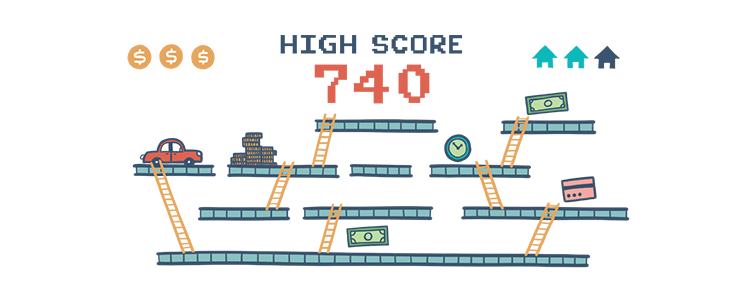Improve Your Credit History

First-time borrowers often have anxiety about low credit scores. They may not have a history of borrowing because they're young, they've never taken out a loan, or even had a credit card.
If you’re getting ready to shop for home mortgages, or any kind of large loan it’s a good idea to begin working on your credit history and getting that score up. To do that, it’s important to know the factors that affect your FICO score:
- Making payments on time: 35%
- Overall debt: 30%
- Length of credit: 15%
- New credit applications: 10%
- Types of credit: 10%
Know Your Score
You can only fix something when you know it’s broken, and knowing your credit score is the first step to helping it go up. Under the Fair Credit Reporting Act, you have a right to request your own credit report from a credit bureau to review it. This allows you to dispute any errors by writing to the relevant credit bureau, which must investigate the dispute within 30 days.
Start Building Credit
Starting a credit history is as simple as signing up for a credit card. Use a credit card to pay for everyday items and set up utility bill payments online through a credit card account in your name. Keep in mind to avoid accumulating debt by paying off the balance in a timely manner.
Don’t Let Your Balance Go Past-Due
Your payment history makes up 35% of your score, making it the most important factor of your credit. The more behind you are on your payments, the more it hurts your credit score. Try to pay off your outstanding balances in full rather than carrying it forward. In addition to avoiding interest payments, it will reflect favorably on your credit report when a lender updates your account status to "paid in full."
Don't Use ALL Your Credit
A key to scoring favorably on your credit is leaving most of it unused. Experts agree that if you use no more than 30% of your available credit, it affects your credit score positively. For example, if you have a 3 credit cards, two with a limit of $1,500 and one with a limit of $2,000, you have $5,000 total credit available. Keeping your combined balance under $1,500 (30% of $5,000) will help maintain a good credit score, because it shows lenders that you are able to use your given credit responsibly.
Avoid Applying for More Credit
When you apply for a new line of credit, lenders perform what is called a “hard inquiry” into your credit. This review of your credit itself affects your score. Applying for credit a number of times in a short timeframe sends a red flag to lenders who might assume that you’re in dire financial straits. So, if you are in the process of repairing a low credit score, avoid making any new applications for credit.

FHA Loan Articles
July 2, 2023Buying a home is a significant milestone in life, and for many, it's a dream come true. However, the path to homeownership can be fraught with challenges, and one of the most concerning issues can be high FHA loan interest rates.
June 27, 2023The FHA loan process is straightforward and has been successfully navigated by millions of homeowners. If you're considering an FHA loan to finance your home purchase, it pays to be prepared. To avoid mistakes before you start your loan application, homebuyers should keep these tips in mind.
June 20, 2023Can an FHA loan be approved if there are late or missed payments on the credit report? Navigating through financial challenges, such as escalating costs of living and employment uncertainties, can indeed make it difficult to maintain a perfect financial record.
March 16, 2023Planning your FHA loan means asking some important questions early in the process. The most obvious question is associated with the type of home you want. How large a house do you need? FHA mortgages allow the purchase of homes with between one and four living units.
February 7, 2023There are tons of reasons why people decide that they’re done with renting and start looking into buying a home. Whatever your reason, deciding to buy a home is a big step, and one of the most daunting aspects is saving up enough money for the down payment.
January 10, 2023When getting ready to shop for a home loan, it's worth taking a look at your credit report. Your credit score is a big factor when lenders take a look at your loan application, and it plays a huge role in the interest rate you get.








